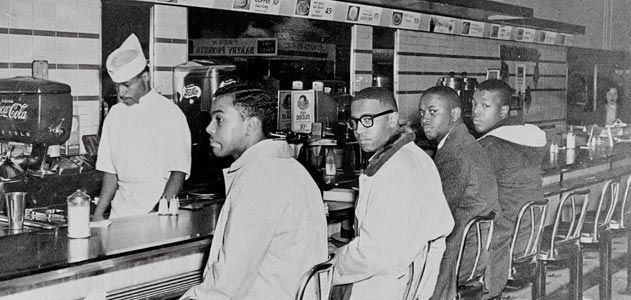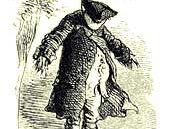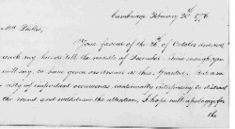Joseph McNeil (from left), Franklin McCain, Billy Smith and Clarence Henderson take part in Day 2 of the sit-ins at Woolworth on Feb. 2, 1960. McNeil and McCain were members of the Greensboro Four, who initiated the protests.
Greensboro four Woolworths sit in students rest of story, Lunch counter sit in reinvigorated civil rights movement, Changed world
From the Greensboro News Record.
“For the Greensboro Four, there’s much more to the story of the sit-ins
This is the time of the year when civil rights legends often recall with reverence the history-making Greensboro moment that birthed a sit-in movement.
It was 59 years ago Friday when N.C. A&T freshmen Ezell Blair Jr. (now known as Jibreel Khazan), Joseph McNeil and the late David Richmond and Franklin McCain ignited a movement at the segregated downtown F.W. Woolworth department store. Their lunch counter sit-in would sweep the nation and help rid the South of Jim Crow laws.
Stools and a piece of the lunch counter where the young men sat are on display in the Smithsonian Institution.
One of those stories involves the Rev. Martin Luther King, who gave credit to Greensboro for reinvigorating the civil rights movement.
Back in 2002, before speaking at the annual fundraising gala for the International Civil Rights Center and Museum, the late national NAACP executive director Benjamin L. Hooksconfirmed King’s account.
“I think Martin Luther King called this the battle cry of the second revolution,’’ Hooks told a crowd of several thousand.
For the Greensboro Four, theirs was an iconic moment in the nation’s history that came during a lull in the civil rights movement. It had been five years since Rosa Parks refused to give up her seat on the bus for a white person.
McNeil, 76, now lives in New York and is a retired stockbroker and major general in the Air Force Reserves. He got affirmation directly from King.
A young Aggie who would go on to start diversity programs in the Air Force, McNeil said it was at the start of the sit-ins that state NAACP president Kelly Alexander Sr. and other officials arranged for him and McCain to meet King after he spoke at White Rock Baptist Church in Durham on Feb. 16, 1960.”
Read more:
I have heard for many years and from multiple sources that during the sit ins, prominent business and religious leaders stepped in to diffuse tensions and insure a more peaceful outcome.



